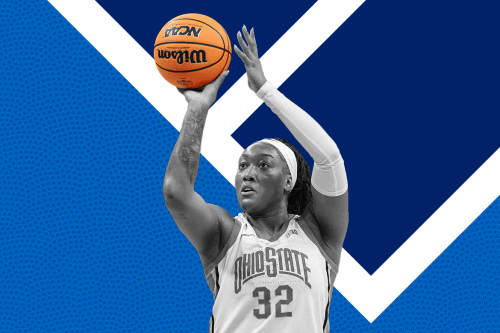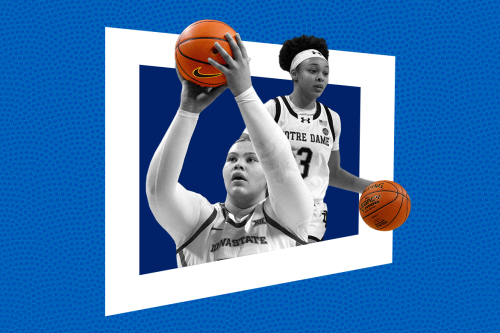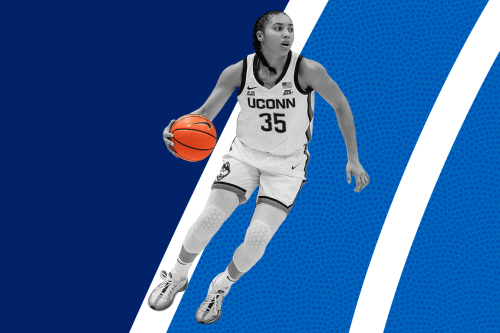How Pro and Everyday Athletes Alike Showcase the Power of “Mom Strength”
Learn what mother strength really looks like for these pro and everyday athletes balancing parenthood and their own goals.
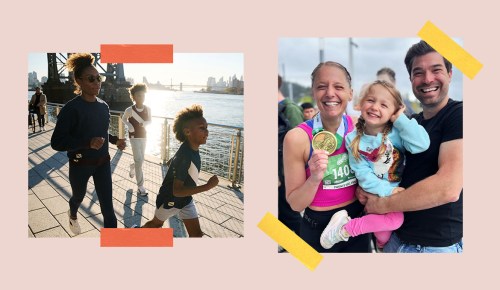
Many people assume that motherhood puts an endcap on athletic performance. Are you a runner? Your fastest days are behind you. A deadlift PR? Better not try it. All those outdoor adventures you’ve dreamed about? Well, you should have checked them off your bucket list before your kids came along.
The idea that your athletic pursuits are over the moment you give birth or start responding to “mom” couldn’t be farther from the truth.
For professional and everyday athletes alike, what becoming a mom actually looks like is traveling cross-country with your four-year-old so they can see your race, skipping your post-workout nap to hang with your family, or climbing thousands of feet up a cliff face to teach your children to chase their goals, no matter what. This, my friends, is what it means when you hear the term “mom strength.”
Elisabeth Akinwale, CrossFit athlete
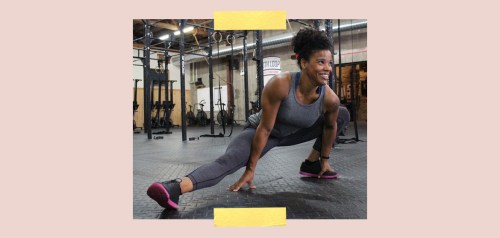
Elisabeth Akinwale is kind of a big deal in the CrossFit community. Her career highlights include several weightlifting records, including a 425-pound deadlift and a 240-pound clean and jerk. But without the birth of her son, Asa, she may never have pursued a career in the gym.
“When my son was three years old, I took on a major life change. I had recently gone through a divorce, was adjusting to co-parenting life, and working in an unfulfilling career,” she tells Well+Good. “I observed that my son was beginning to perceive work as a drag and an unpleasant necessity of life—because it was for me at the time.”
Akinwale didn’t want Asa to grow up thinking that work had to be a dreaded task, so she decided to turn her passion, CrossFit, into a career, becoming a professional CrossFit athlete and a health and fitness coach. “This change was a huge risk, especially as a newly single parent, but the risk allowed me to fully live my values and demonstrate them to my son,” she says. The CrossFit legend is now also the founder of 13th Flow, an online training program offering functional fitness training to an inclusive community.
Want to work out like Akinwale? Try this 10-minute full-body session she created for Well+Good:
Now 16 years old, Asa has watched his mom lift heavy objects and change her clients’ lives. “He’s grown up seeing me be brave and strong in my decision-making, be a leader in my work, and also have the flexibility to prioritize family time,” she says. “Mom strength has helped support us in having a strong relationship, and I can talk to my teenager honestly and from a place of lived experience about personal agency and taking accountability for building the life you want.”
Alison Feller, host of Ali on the Run podcast
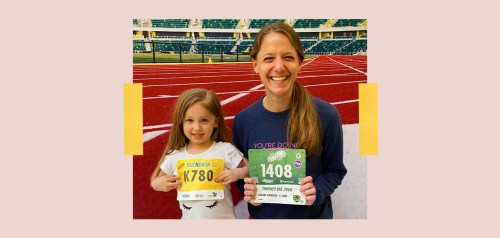
If you know the name Ali Feller, you’re probably already aware that the podcast host has a disarmingly cute daughter named Annie. When Well+Good caught up with Feller in late April, she was en route to Eugene, Oregon, to run her first marathon since giving birth in October 2018.
Feller says mom strength is hard to describe but easy to spot. “When you become a mother, however that happens for you, your entire world changes,” she says. “From that moment on, you’re never not a mom. Even if you aren’t physically with your child for minutes, hours, or days at a time, you’re always a mother, and I know that for me, it factors into nearly every decision I make,” she says.
Gold Medal Couple Tara Davis-Woodhall and Hunter Woodhall Talk Marriage, Motivation, and Their Next Chapter With Nike

Coach Kara Lawson Wants You to ‘Handle Hard Better’—and Here Are 3 Ways to Do Just That
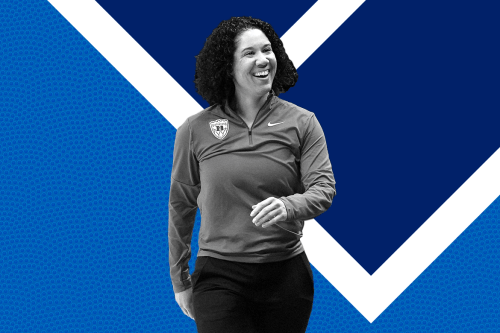
JuJu Watkins Leaves March Madness With ACL Tear—and This Knee Injury Is More Common Than You Think
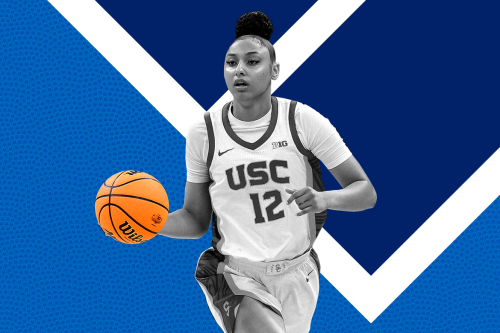
She witnesses mom strength in the athletes and moms she interviews for her podcast, including pro runners Keira D’Amato, Sara Hall, Aliphine Tuliamuk, Sara Vaughn, Edna Kiplagat, whom she describes as “women competing at the highest levels, chasing their Olympic dreams with their children by their sides.”
“So I think that’s it: I think mom strength is loving your child[ren] with every fiber of your being and showing up for them—however that looks for you—without sacrificing your own hopes, dreams, and goals. It’s something I strive for every day. Do I fail, often? You bet. Do I plan on giving up anytime soon? Hell no,” says Feller.
She recalls a moment last summer when she interviewed 2018 Boston Marathon winner Des Linden while Annie watched “Paw Patrol” backstage. “That, to me, was a total ‘this is it—this is the dream’ moment,” says Feller.
In the future, Feller plans to chase more dreams with her daughter by her side and co-pilot Annie’s future endeavors. On April 30, she ran a personal record at the Eugene marathon, completing the distance 10 minutes faster than ever before. But before that, during our interview, she reflected on how different her life was from the last time she was gearing up to run 26.2. “[This time], I woke up in the 4 a.m. hour to get my training runs in so that I could be home and showered before Annie woke up. I made sure I committed to my training but that I was never too tired to play with her,” said Feller.
As she looked ahead to the race, she told us, “When the race will, inevitably at some point, get hard, I’m running to her. Is traveling cross-country to run 26.2 miles with a 4-year-old in tow easy? Hell no. But with her at the finish line, I know I’ll get there, and that no matter how the race goes for me, I have that hug on standby. Being a mother has changed my relationship with running and with my body in such drastic ways. All the best ways.”
Aubrey Runyon, professional climber, guide, and trans rights advocate
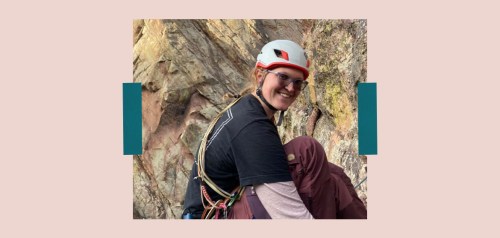
Professional climber Aubrey Runyon says that setting a strong example of parent strength is a big reason why she spends time outdoors. “I wouldn’t say [parenting] gives me the desire to push for any one goal, but I just have this overarching desire to leave a legacy for my kids. I want them to see that there is this great huge world, and we need to move our bodies through this beautiful earth we have,” she says. “I’ve always hoped they take from my experiences the sense of exploration, the sense of pushing through fears and through comfort levels, that has been a huge thing in my life.”
Earlier this year, Runyon conquered a major goal in this “great huge” world when she completed 10,000 climbing pitches (or climbing routes that require multiple anchor and belay points). This goal was picked at random, and Runyon says there’s a lesson for her children there, too. “I just love the idea of making big dumb goals that don’t really matter. And then just going and doing the thing just to do it,” she says. “It doesn’t have to mean something more. You don’t have to do things for any other reason than to have fun.”
In 2020, Runyon shared a post on Instagram about a decision that would change her life forever: “This shouldn’t come as a surprise to many that know me personally, but I am transgender. I’ve not been shy about it, but I also haven’t said it outright.” By then, Runyon had already begun gender-affirming care to begin her transition. “I’m in a better place and happier than I’ve ever been,” she wrote.
While there’s no denying that Runyon has her own personal flavor of strength, she tells me that, at home, she’s not too concerned with being called a mom. Her children, Avery (eight) and Zoe (five) don’t have to call her “mom.” “When my wife and I finally decided to talk to my kids about [my transition], I essentially just said, I want you to call me whatever you’re comfortable calling me. So if you want to call me ‘mom,’ call me ‘mom.’ If you want to call me ‘dad,’ call me ‘dad,’” says Runyon.
“They still call me ‘dad’—and that’s just because my older daughter said, ‘I want to call you dad. I’ve always called you dad.’ That’s totally fine. I feel like that’s a title that I earned—and I’m proud of that. And then there are other times that they call me Mom randomly, and that’s fine. I’m just happy to be a parent,” says Runyon.
Erica Stanley-Dottin, sub 3-hour marathoner
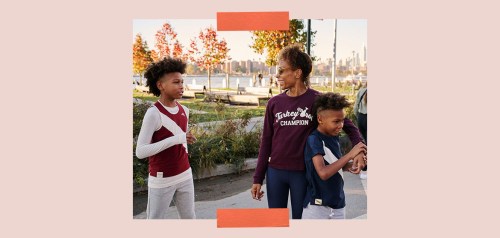
When Erica Stanley-Dottin isn’t running (she’s one of only 24 Black American women to have clocked a sub-3 hour marathon) or acting as a community manager at Tracksmith New York, she’s a mom of two: Jett (9) and Austin (12). After running her first 26.2 in 2008, Stanley-Dottin took a nine-year hiatus to have children. “Then I was on mom duty. When I came back to marathons in 2017, I had two small kids and was really just getting back out there,” she says.
Now that she’s back racing and breaking records, Stanley-Dottin says two types of mom strength—physical and mental—have carried her through 10 postpartum marathons, and she just keeps speeding up. (Remember that sub-3-hour race?) “I think of physical strength in terms of my body going through pregnancy, my body recovering from pregnancy,” she says. “And so, that’s one thing. Then I think of what it takes mentally, how we’re all juggling so much. Making space for training for a marathon is essentially another job.” She adds that she’s proud to show her kids the discipline, organization, and time management demanded of professional athletes.
That said, when Stanley-Dottin hits the track, roads, and trails, she says it’s really about taking a moment for herself and letting go of the weight of parenthood. “I’m intense. I train hard. I travel to my races. I’m trying to manifest every time. It’s the one thing I can be intense about for me, not for anyone else,” she says.
Once the shoes are off and she’s back at home hanging with her kids (no post-run naps in the Stanley-Dottin household!), she says that she really loves sharing her training and racing accomplishments with her kids. They come to her races and witness her putting in the daily work required of elite athletes. “My coach told me one time, ‘You come home, and your kids see you plopped down on the couch after you’ve done a 20-miler, and you’re dead for the rest of the day. That’s crazy. That’s going to stick with them?’ So I think of it that way. I hope they see the motivation that comes with training hard for something,” says Stanley-Dottin.
As of now, Austin and Jett are majorly into basketball—but who knows what the future holds?
Sign Up for Our Daily Newsletter
Get all the latest in wellness, trends, food, fitness, beauty, and more delivered right to your inbox.
Got it, you've been added to our email list.
